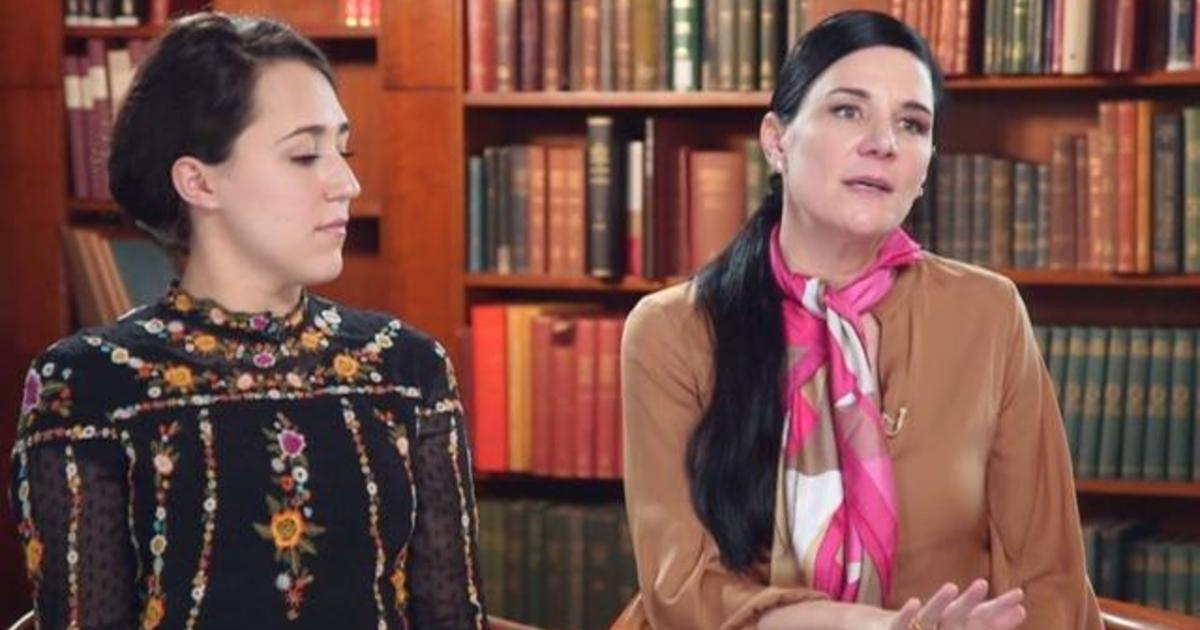A mother-daughter duo is donating books to raise awareness of mental health. Sonja Wasden and her daughter Rachael Siddoway co-wrote “An Impossible Life,” which details Wasden’s struggles with bipolar disorder and how it affected her family and friends.
Before the coronavirus pandemic, the pair traveled to libraries across the country. But when the pandemic shut down libraries and halted travel, that didn’t stop them from sharing the message that mental health does not discriminate based on location, education or socioeconomic status.
Wasden has struggled with bipolar disorder for most of her life.
“You just feel like you can’t breathe,” she told CBS News senior medical correspondent Dr. Tara Narula. “It becomes so painful that you no longer see your children, your husband. And all is left is this pain.”
Wasden said she stopped looking at death with sympathy and started looking at death with envy.
“I wanted to die,” she said. “I was desperate to get relief of the pain. And that’s the only way I saw out.”
At 35, the mother of three was forced into a psychiatric hospital.
“My husband had hit rock bottom and said, ‘This is it. We’ve got to get her in the hospital.’ And I refused to go. And the doctors asked me, ‘Do you have thoughts of suicide?’ And I said, ‘Well, of course, just like you do.’ And when he said, ‘Well, how many times do you think of suicide a day?’ And I thought, ‘Well, just the average amount, just as often as you do,'” Wasden said. “And so I was admitted against my will.”
That was a turning point for Wasden.
“They started to give me medicine. And that’s when they made me face my diagnosis that I was bipolar. And I did,” she said.
Siddoway is the oldest of Wasden’s children.
“Growing up, all I knew was my mom was really fun. And then she’d get really sad,” Siddoway told Narula. “We were all aware she tried to take her own life. But because we knew ultimately she loved us and we were best friends, I could see her as a person going through something hard. And almost feel more-compassion for her as my best friend, as my mother I loved, instead of letting it be traumatizing. We all feel like we’re this tight little army group, that we’re in a foxhole together. And we came out stronger for it.”
Together, the mother-daughter duo wrote “An Impossible Life,” sharing their story of survival.
“After my attempted suicide, I was taken to the hospital, where my husband was CEO. And a leading psychiatrist there told him, ‘Never bring her back to this hospital again. Take her where no one knows you guys.’ And I felt shame and embarrassed. And there was, like, almost a fire that got lit in me of, ‘I am not going to hide anymore. The truth needs to be told,'” Wasden said.
And they’ve gone beyond just telling the truth. Before the pandemic hit, they traveled more than 32,000 miles on their own dime to 42 states and have donated more than 500 books. Since then, they have mailed 100 books to libraries that have reopened.
The book has helped Wasden and Siddoway’s relationship.
“It was so healing. When I was 16, I found my mom’s suicide note. And I was really angry. I thought it was selfish that she’d want to leave me and my entire family just like that. And after writing this book with her, I have a better understanding of the pain she went through,” Siddoway said.
And it’s also helped those who have read it like Kimberlee Guin, who met Wasden for the first time at Brooklyn Public Library.
“Reading Sonja’s book was very powerful in the sense that it enabled me to forgive myself. It enabled me to have more compassion for myself, for the mistakes I made because, obviously, you don’t choose this,” Guin said. “The book helped me understand what my family members would have gone through. But most importantly, it gave me hope.”
By offering hope, Wasden has found purpose in her suffering: to show readers what was once an impossible life is now a possible one.
Now, Wasden said she is feeling good.
“I have a beautiful life now. My marriage of 27 years is going strong. I have good relationships with all my children. I don’t stay in bed all day anymore,” she said. “Yes, I have a mental illness. And yes, I have moments of pain and anxiety and difficulty. It’s a lifelong illness that I have to manage. But I can have a life worth living too.”
Wasden’s father was diagnosed with bipolar disorder later in life and died by suicide. One of her sons was also diagnosed with bipolar disorder and is doing well. The most important thing, they told Narula, is to keep talking about it, especially now when many feel so isolated and alone.
For immediate help if you are in a crisis, call the toll-free National Suicide Prevention Lifeline at 1-800-273-TALK (8255), which is available 24 hours a day, 7 days a week. All calls are confidential.
The Disaster Distress Helpline at 1-800-985-5990, is also confidential, free and available 24 hours a day, 7 days a week. People can also text TalkWithUs to 66746 to connect with a trained crisis counselor.
